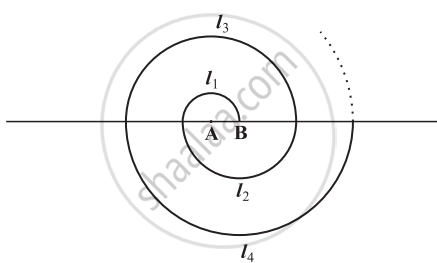Advertisements
Advertisements
Questions
If the 3rd and the 9th terms of an AP are 4 and –8 respectively, which term of this AP is zero?
If the 3rd and the 9th terms of an arithmetic progression are 4 and -8 respectively, Which term of it is zero?
Solution
Given that,
a3 = 4
a9 = −8
We know that,
an = a + (n − 1) d
a3 = a + (3 − 1) d
4 = a + 2d ...(I)
a9 = a + (9 − 1) d
−8 = a + 8d ...(II)
On subtracting equation (I) from (II), we obtain
−12 = 6d
d = −2
From equation (I), we obtain
4 = a + 2 (−2)
4 = a − 4
a = 8
Let nth term of this A.P. be zero.
an = a + (n − 1) d
0 = 8 + (n − 1) (−2)
0 = 8 − 2n + 2
2n = 10
n = 5
Hence, 5th term of this A.P. is 0.
RELATED QUESTIONS
Find the sum of all natural numbers between 250 and 1000 which are exactly divisible by 3
Find the sum given below:
–5 + (–8) + (–11) + ... + (–230)
Find the sum of first 22 terms of an AP in which d = 7 and 22nd term is 149.
Show that a1, a2,..., an... form an AP where an is defined as below:
an = 3 + 4n
Also, find the sum of the first 15 terms.
A spiral is made up of successive semicircles, with centres alternately at A and B, starting with centre at A of radii 0.5, 1.0 cm, 1.5 cm, 2.0 cm, .... as shown in figure. What is the total length of such a spiral made up of thirteen consecutive semicircles? (Take `pi = 22/7`)

[Hint: Length of successive semicircles is l1, l2, l3, l4, ... with centres at A, B, A, B, ... respectively.]
In a potato race, a bucket is placed at the starting point, which is 5 m from the first potato and other potatoes are placed 3 m apart in a straight line. There are ten potatoes in the line.

A competitor starts from the bucket, picks up the nearest potato, runs back with it, drops it in the bucket, runs back to pick up the next potato, runs to the bucket to drop it in, and she continues in the same way until all the potatoes are in the bucket. What is the total distance the competitor has to run?
[Hint: to pick up the first potato and the second potato, the total distance (in metres) run by a competitor is 2 × 5 + 2 ×(5 + 3)]
If the nth term of the A.P. 9, 7, 5, ... is same as the nth term of the A.P. 15, 12, 9, ... find n.
Find the sum of the first 13 terms of the A.P: -6, 0, 6, 12,....
Find the sum of the first 40 positive integers divisible by 3
Determine the A.P. Whose 3rd term is 16 and the 7th term exceeds the 5th term by 12.
In an A.P. the first term is 25, nth term is –17 and the sum of n terms is 132. Find n and the common difference.
Find the value of x for which the numbers (5x + 2), (4x - 1) and (x + 2) are in AP.
The sum of three consecutive terms of an AP is 21 and the sum of the squares of these terms is 165. Find these terms
If the sum of first m terms of an AP is ( 2m2 + 3m) then what is its second term?
Choose the correct alternative answer for the following question .
The sequence –10, –6, –2, 2,...
If the seventh term of an A.P. is \[\frac{1}{9}\] and its ninth term is \[\frac{1}{7}\] , find its (63)rd term.
The sum of first n terms of an A.P is 5n2 + 3n. If its mth terms is 168, find the value of m. Also, find the 20th term of this A.P.
Which term of the sequence 114, 109, 104, ... is the first negative term?
If the first, second and last term of an A.P. are a, b and 2a respectively, its sum is
The 9th term of an A.P. is 449 and 449th term is 9. The term which is equal to zero is
Q.4
The sum of the first three terms of an Arithmetic Progression (A.P.) is 42 and the product of the first and third term is 52. Find the first term and the common difference.
Find the sum of first 10 terms of the A.P.
4 + 6 + 8 + .............
The 11th term and the 21st term of an A.P are 16 and 29 respectively, then find the first term, common difference and the 34th term.
For an A.P., If t1 = 1 and tn = 149 then find Sn.
Activitry :- Here t1= 1, tn = 149, Sn = ?
Sn = `"n"/2 (square + square)`
= `"n"/2 xx square`
= `square` n, where n = 75
If a = 6 and d = 10, then find S10
Find the sum of numbers between 1 to 140, divisible by 4
The sum of the first 2n terms of the AP: 2, 5, 8, …. is equal to sum of the first n terms of the AP: 57, 59, 61, … then n is equal to ______.
The sum of first n terms of the series a, 3a, 5a, …….. is ______.
Find the sum of first seven numbers which are multiples of 2 as well as of 9.
